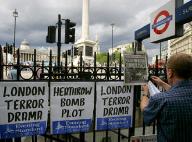Europe on High Alert After British Terror Scare
The thwarting of an attack in Britain to blow up aircraft in mid-flight has underlined the need for Europe to stay both tough and vigilant when it comes to fighting terrorism, according to security experts in Germany.
The thought of having narrowly avoided a potentially major terrorist attack sent jitters through western Europe Thursday as British authorities said they had foiled assaults on a "number of aircraft." Police arrested 21 people in the UK as the incident once again raised questions about the level of threat Europe faces from terrorism since the September 2001 attacks in New York and Washington.
"This is certainly not just a British problem, but affects all Europeans who are grappling with the problem of homegrown terrorism," said Berndt Georg Thamm, an expert on terrorism.
 Not the only attack foiled?
Not the only attack foiled?"Reality has caught up with us after the World Cup," said Klaus Jansen, head of the German Detective's Association (BDK). "Whether it's the two bombs found in Dortmund and Koblenz on the rail network (earlier this month) or the current attack in England, it shows that there's a constant latent threat," Janssen said. "We can't afford to lower our guard."
Others point out that the current incident is by no means an isolated one.
"The media always seizes on the attacks that have already happened -- Sept. 11, Madrid, London," said David Schiller, a terrorism expert. "But let's not forget that, every year since Sept. 11, 2001, terrorists have planned at least one attack or series of attacks in Europe per year which have been foiled. These things don't make it into the press."
The handiwork of al Qaeda?
Though Britain hasn't released details on the identity of those arrested, experts say the nature of the alleged plot suggests a connection to al Qaeda.
"In the last two months al Qaeda promised that it would avenge Iraq and Afghanistan by attacking British and American aviation assets -- I see a direct link with that," terrorism expert Paul Beaver told news agency Reuters.
All signs pointed to al Qaeda planning a strike to coincide with the upcoming fifth anniversary of the Sept. 11 attacks, Schiller said. "The organization is known for its penchant for symbolism and date-specific campaigns," he said. "And al Qaeda is also known to target economic infrastructure, whether it's tourism or aviation."
Thamm also saw a link between the foiled plot and al Qaeda, and he stressed that Germany wasn't immune to attacks.
"It would be fatal for Germany to think we are in a special position because we didn't participate in the war against Iraq," Thamm said, pointing out that Germany had 2,800 soldiers stationed in Afghanistan. "Black, red, gold really isn't a bullet-proof vest anymore."
Hand luggage a "weak link"
Airports around Europe have beefed up security after reports that the bombers were planning to smuggle liquid explosives in hand luggage with battery triggers possibly stored in laptops or calculators.
Experts say the tactic is sophisticated, though the idea isn't entirely new. In Dec. 2001, so-called "shoe bomber" Richard Reid was overpowered after trying to set light to a fuse connected to explosives in his shoes before boarding an American Airlines flight in Paris.
"Though there are loopholes in the entire machinery fighting terrorism, hand luggage does remain a weak link," Schiller said, adding that technologies to better scrutinize carry-on luggage, such as sniffing out explosives, still remain in the pipeline.
"Let's face it -- we will not manage to prevent all attacks. Intelligence gathering and security measures can at the most work as the last firewall."
Getting close to the masterminds
At the same time, experts say that British officials' thwarting of the alleged terrorist plot could boost the fight against terror.
"With security officials preventing the attack well in time, there is a good chance that enough proof can be furnished during a legal trial -- which is the right way to go about preventing a major crime," said Jansen. "We have to try to get as close as possible to the masterminds behind the attack."
Sonia Phalnikar
Deutsche Welle 08/2006

0 Comments:
Post a Comment
<< Home